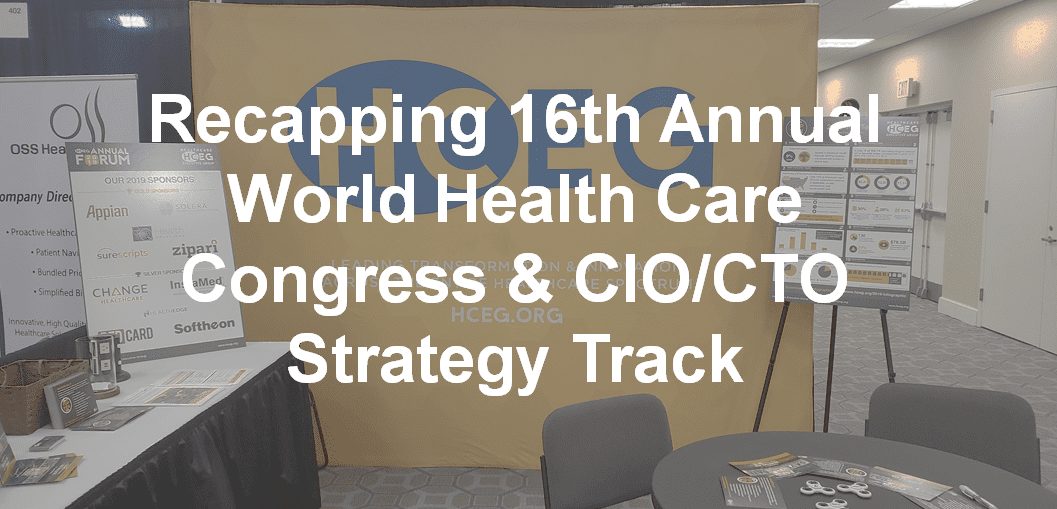
Last week a lot of planning, coordination and content development by the HealthCare Executive Group came together at the 16th Annual World Health Care Congress in Washington, DC. For this year’s congress, HCEG partnered with World Congress Events to present the CIO & CTO Strategy Track. This post recaps a few highlights of the 2019 World Health Care Congress, shares some insight from the healthcare leaders and champions presenting at the event and in our the CIO & CTO Strategy Track, and provides some select presentation materials, recordings and other content from the event.
HCEG Top 10-Related Highlights From 2019 World Health Care Congress
As expected, many of the sessions and keynotes at the WHCC event addressed items on the 2019 HCEG Top 10 list with “social determinants of health” (#3 on the 2019 HCEG Top 10) and “value-based payment” (#4 on the 2019 HCEG Top 10) being pervasive themes throughout the keynotes, sessions and exhibit hall.
Value-Based Care – It’s More Than Just Adding An Alternative Payment Model
One of the sessions in the Provider Transformation track, ‘Do Medicare Changes Enhance or Hinder Clinical and Payment Transformation‘ emphasized the role of the primary care doctor in the shift from the dominant fee-for-service reimbursement model to new value-based-payment methods. Panelists also called out that to truly transform our health care system, change must not just focus on payment models but also deliver scalable clinical and operational methods. And HCEG members acknowledge this as “Operational Effectiveness” is ranked #8 on the 2019 HCEG Top 10 list.
Defining, Measuring, and Communicating Quality Measures are Key for Leveraging Social Determinants of Health
Another session titled “SDoH Business Strategy: Quantify and Communicate the ROI and VOI of SDoH Initiatives” shared the following key points and considerations for healthcare organizations looking to address social determinants of health as barriers to care:
- Quality measures that incorporate social determinants of health must be developed and understood BEFORE starting programs and initiatives.
- Readily available public data is not granular enough to capture SDoH factors needed appropriate quality measures.
- Conducting clinical trials on proposed quality measures can help to understand and quantify the benefits of SDoH initiatives.
- Incorporate patient/member personalization into a standardized, common infrastructure that enables economies of scale.
- Predictive analytics – a perennially high-ranking item on HCEG’s Top 10 lists – is THE critical component of SDoH programs.
- Combining clinical data from EHR’s with claims and other administrative/demographic data records allows health plans/health systems opportunities never before easily attainable.
- Health plans, health systems, and providers must clearly understand and communicate the benefit that addressing social determinants of health can have for their members and patients.
- Organizations should strive to assign a financial measure assigned to each quality measure.
CIO & CTO Strategy Track at World Health Care Congress
HCEG board chair Kim Sinclair, CIO at BMC HealthNet Plan and board member Alan Abramson, Sr VP of IT & CIO at HealthPartners and Co-Chair of the Minnesota eHealth Advisory Committee, shared some real-world examples of how they and their organizations are addressing some of the items on the 2019 HCEG Top 10 list.
Alan Abramson shared four areas of focus for HealthPartners:
- Formally chartering projects to deploy technology-based approaches to largely manual processes
- Carving out and focusing on efforts to improve patient experience
- Address inefficiencies in technology ecosystems, business policy, and processes
- Establishing R & D projects to assess opportunities and benefits of new, emerging technologies
Increasing Operational Effectiveness in Health Plans & Health Systems
Alan went on to share that the #1 initiative his healthcare organization has been focusing on last year, in 2019 and will continue to focus on in 2020, is increasing Operational Effectiveness (#8 on the 2019 HCEG Top 10). Alan provided some examples as to how HealthPartners is achieving greater operational effectiveness including:
- Utilizing Lawson Financials to consolidate multiple disparate functions
- Rehosting and re-platforming administration systems such as employer group setup, utilization management reporting, new member enrollment, and patient admission, discharge and transfer.
- Positioning systems, policies, and procedures to accommodate increases in individual health plan coverage
- Consolidating four different laboratory systems into one system
- Using Robotic Process Automation (RPA) to automate user administration and security
- Using AI-powered bots to automate 27,000 software QA tests that took three weeks to complete and that now take 17 hours.
- Alan noted that achieving success via ‘standardization’ in one area often leads to end users demanding improvement via standardization in other areas.
Payer-Provider Data Sharing and Interoperability Critical in Risk-Sharing Relationships
Kim Sinclair’s healthcare organization serves approximately 400,000 members and patients via its health plan, hospital, and medical centers – 80% of whom are Medicaid beneficiaries and represent 15% of the state’s Medicaid population.
Like other integrated healthcare delivery systems – especially those entering the nascent world of ‘accountable care,’ Kim noted that investments in provider network management and payer-provider interoperability have often lagged that of other initiatives. Moreover, a competitive market with many small medical practices lacking sufficient IT systems and a tendency to ‘throw bodies at a problem’ has increased the challenges her organization faces.
Kim also shared some examples of how her organization is addressing their challenges, issues, and opportunities:
- Integrating various systems with a focus on creating an industry-leading accountable care organization (ACO).
- Formal projects to identify and stratify members and patients with complex care management needs.
- Revising policies, procedures, teams, and systems to effect a truly integrated system.
- Reducing pended claims and time to pay – particularly important where both payer and provider are sharing risk.
- Focusing on change management and investing in payer-provider interoperability and support.
RELATED: Executives, Policymakers & Thought Leaders Address Healthcare Innovation and Disruption
Cybersecurity – Think Beyond Enterprise and Employee Training
In this CIO & CTO Strategy Track session, panelists discussed cybersecurity at the end-user level. They emphasized the importance of leadership having a strong grasp on the ‘foundational’ components of cybersecurity (patch management, identity/access management, perimeter security, etc.) And also encouraged the audience to pay attention to data assets outside their own four walls. For instance, the use of Software as a Services (SaaS) and 3rd parties they contract with (outsourced vendors) who possess their organization’s sensitive data.
HCEG board member Eric Decker and SVP of IT & CIO at Independent Health spoke about how his mid-sized health plan has evolved beyond the core technical cybersecurity team as the ‘first line of defense’ by chartering a Risk Office responsible for creating and testing their cybersecurity framework. His organization also has an Internal Audit team that regularly audits core controls as well as the cybersecurity framework.
Jothi Dugar, Chief Information Security Officer in the Office of the Director at the NIH Center for Information Technology shared what seems like an obvious approach to thinking about cybersecurity but may not, in fact, be so common:
Think holistically – consider the psychology of cybersecurity and how to optimize your workforce against threats.
Tim Thull, SVP of IT & CIO at Medica Health Plan spoke about how it is important to have strong oversight, governance, and controls framework around information risk management from your board of directors to individual staff. Medica has implemented HITRUST as common security framework with an information risk program which provides sound technology solutions and controls. Robust training and awareness remain a critical component in ensuring everyone is an active participant in strong cybersecurity defenses.
Optimize Information Sharing to Generate Real Value from Data
Latecia Engram, MSPH from the ReImagine HHS Data Insights Initiative/ACF Office on Trafficking in Persons at Health & Human Services presented the “Optimize Information Sharing to Generate Real Value from Data” session in the CIO & CTO Strategy track.
Latecia spoke about the importance of viewing data as a strategic asset, explained that “the ‘Why’ we share information matters” and offered some lessons learned during the Opioid Symposium and Code-a-Thon sponsored by HHS.
- Data are in silos
- Data sharing is inefficient
- Analytics capacity is uneven
- Data sharing is costly
Video Interviews by Mabel Jong at 2019 World Health Care Congress
One of the interesting and informative parts of the WHCC event was their WHCC TV feature where Mabel Jong – professional on-camera interviewer and panel moderator specializing in healthcare – does short interviews with keynote speakers, session panelists, and other healthcare leaders and champions participating in the Congress.
Mabel interviewed Ferris Taylor, recent Chief Operating Officer of Arches Health Plan and HCEG’s executive director. More about this interview will be shared as the recordings are released. In the meantime, you can find many of the interviews performed by Mabel Jong on the World Congress Events YouTube Channel.
HCEG Member Feedback on 16th Annual World Health Care Congress
HCEG Board members Cate McConnell, Healthcare Payer Industry Practice Lead at Appian Corporation and Eric J. Decker, SVP of IT & CIO at Independent Health shared their insight on the 16th Annual World Health Care Congress:
What was unique about the WHCC event?
Eric: The keynotes went right to the heart of the issues impacting our industry today (transparency, value-based payments, social barriers, member engagement, and affordability). Likewise, the breakout sessions were plentiful and offered a diverse array of topics to choose from.
Cate: WHCC, being in Washington DC, includes policymakers in greater numbers than most conferences. It was good to hear some of the interesting ideas shared by the policymakers. I would have liked to have more people from the current HHS/CMS administration who are shaping healthcare policy speak at WHCC.
How did WHCC’s event differ from what HCEG presents with its Annual Forum?
Eric: Many healthcare conferences – WHCC included – include limited time for questions and answers, not only in the keynotes but also the breakout sessions. The event had nowhere near the time that HCEG’s forum includes for questions (and even debate).
Cate: WHCC is much bigger than HCEG’s annual forum which leads to fewer and less intense opportunities for networking and discussion. The large exhibit hall/show floor can sometimes be a distraction.
What didn’t you see or what could have been better about WHCC?
Cate: Pricing transparency is ‘critical’ in healthcare – in terms of procedures, tests, and drugs – but there weren’t any discussions of how to do this, and what this means to provider compensation. The free market disruptors will likely force this on the industry, which appears unwilling/unready to address it themselves. A speaker made the point that of the two industries that don’t have price transparency – college education and healthcare – prices increase many times greater than inflation because there are no incentives to become more efficient.
What were some things you felt were ‘most important’ for WHCC attendees to absorb?
Cate: Many speakers acknowledged that disruption is coming and that Amazon, Google, and Apple are the prime disruptors. Yet most executives shrugged off this threat with “they will learn healthcare is complex.” This seems to be an “innovator’s dilemma” situation where current industry players are unable to disrupt themselves due to entrenched business models. But what will happen to healthcare if Amazon drives sweeping disruption as it did in retail? Are we ready for widespread bankruptcies?
“External Market Disruption” is ranked #7 on the 2019 HCEG Top 10 list.
Other Recaps & Insight from 2019 World Health Care Congress
Here’s a bit about what others are sharing from the 2019 HCEG Top 10 list at the 16th Annual World Health Care Congress:
5 Things to Know From World Health Care Congress 2019 – Via AJMC
Unlocking Innovation in Value-Based Care – Via FierceHealthcare
How to speed up the shift from volume to value? – Via FierceHealthcare
How Bright Health is changing the payer-provider dynamic – Via FierceHealthcare
Trump likely to target Medicare in quest for lower drug prices – Via FierceHealthcare
Importance of Process Measures When Determining Value of SDOH Initiatives – Via AJMC
Gottlieb talks about lessons from opioid crisis in first speech since leaving FDA – Via FierceHealthcare
RELATED: Top Tweets from 16th Annual World Health Care Congress – #WHCC19
A Unique Opportunity for Healthcare Executives, Leaders & Champions
The 16th Annual World Health Care Congress was a great opportunity for those working to transform the healthcare industry during these uncertain times. And the HealthCare Executive Group was honored to have partnered with World Congress Events to host the new CIO & CTO Strategy Track.
For another opportunity to learn about new strategies and approaches to addressing the challenges, issues, and opportunities facing healthcare leaders – and to establish new relationships to facilitate your organization’s digital transformation – consider joining other healthcare executives, leaders, and champions at our 2019 Annual Forum in Boston on September 9th through the 11th. The year’s agenda is centered around the following major themes supported by the 2019 HCEG Top 10:
- Technology & Its Role in Transformational Industry Change
- Digital Health: Consumer & Organizational
- Pharmacy Costs and Opioid Management
In addition, all participants in our 31st Annual Forum will be treated to a special networking event between the Boston Red Sox and the New York Yankees at Fenway Park on September 9th – at no additional charge.
Check out some photos, program guide and presentation materials from last year’s Annual Forum celebrating our 30th anniversary. And visit this page for more information and to register.
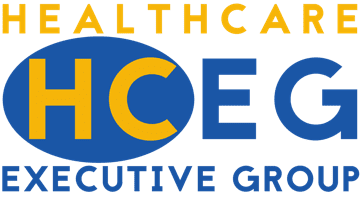
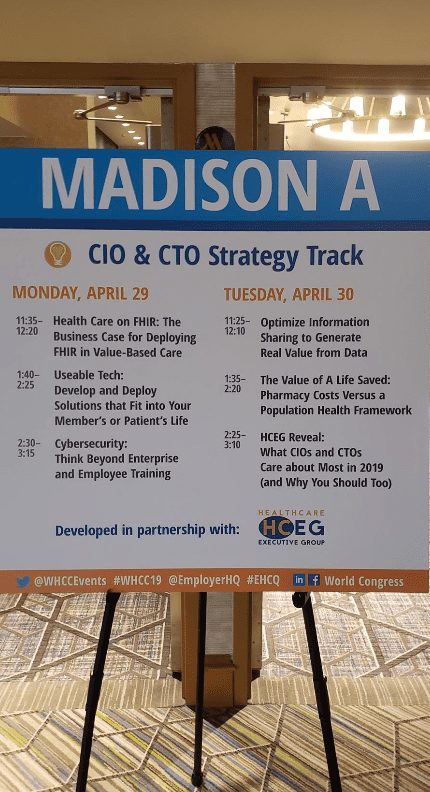

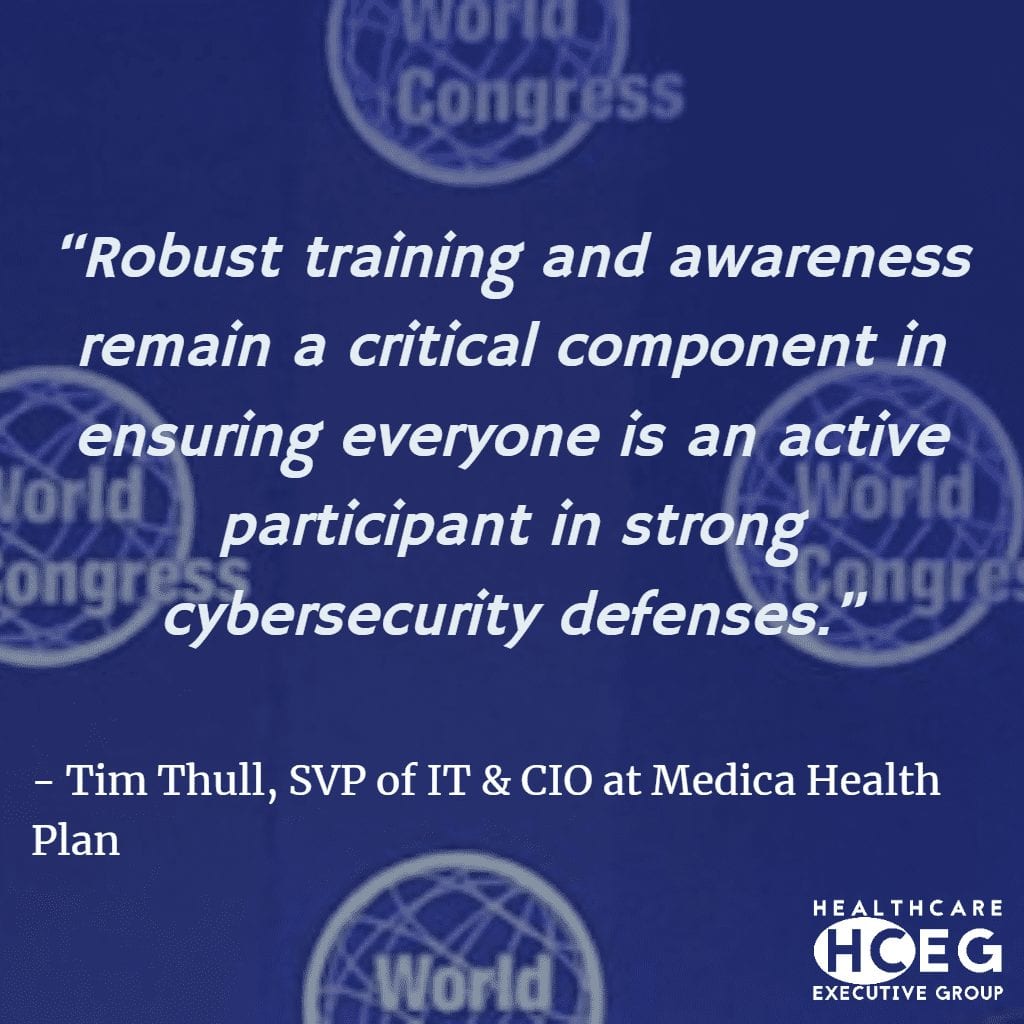
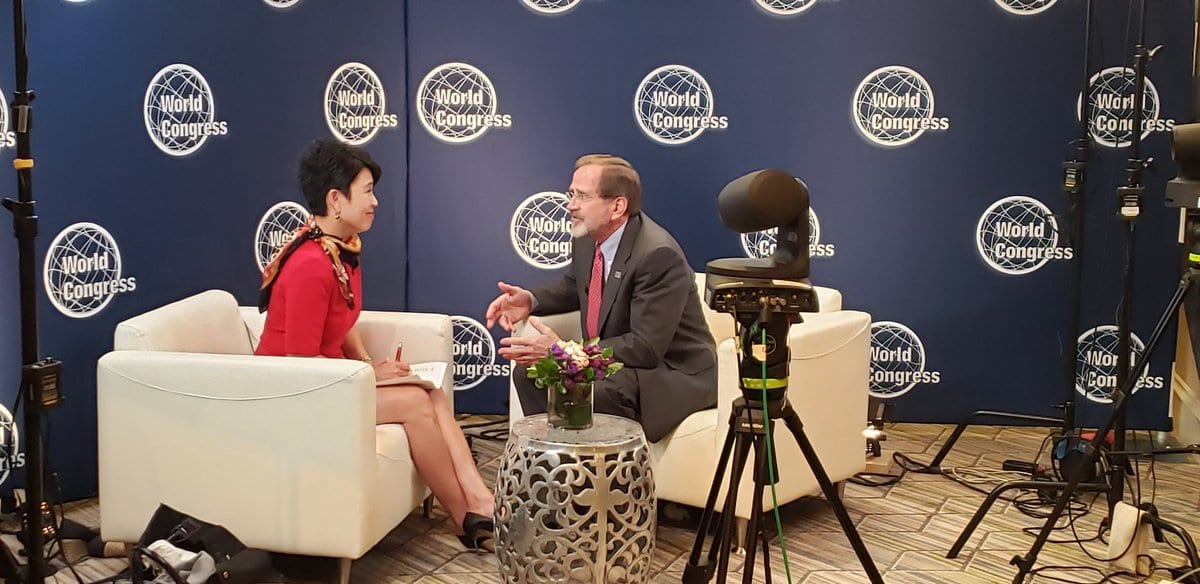
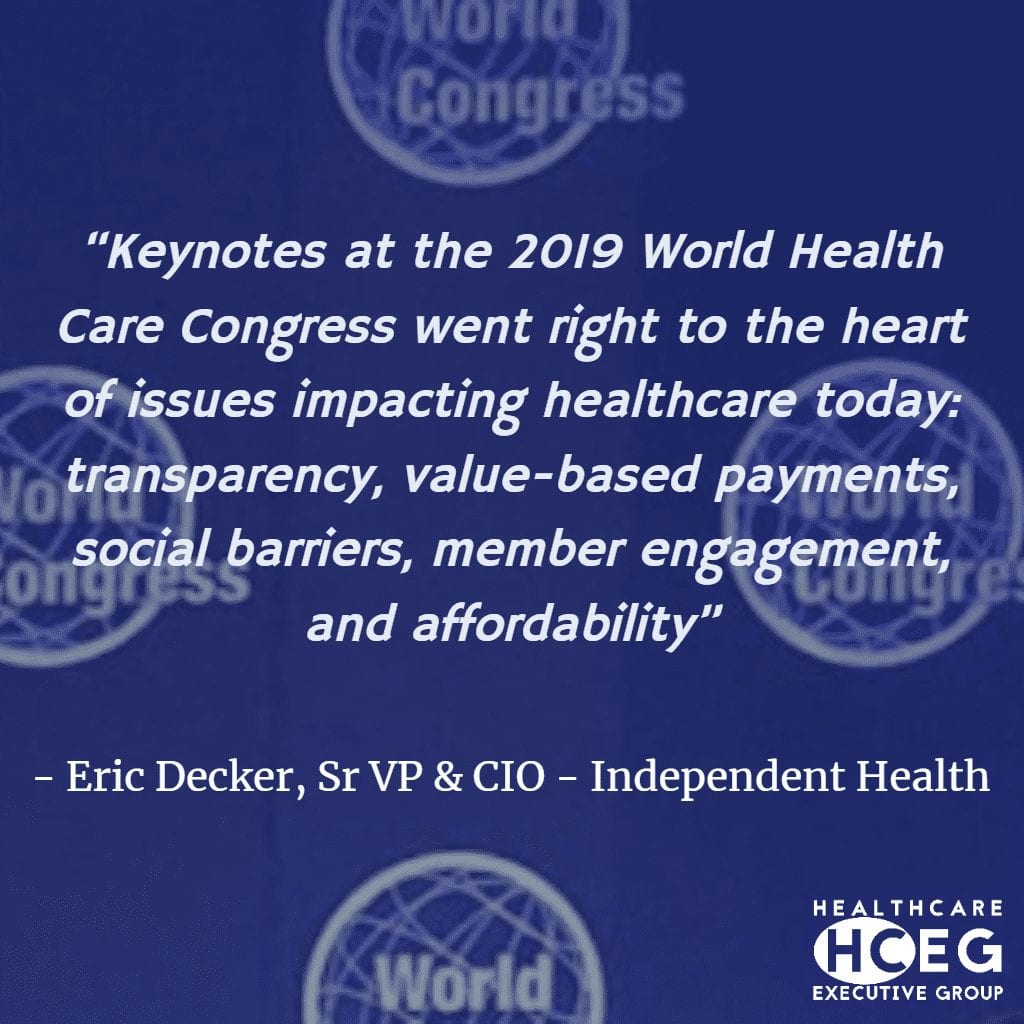
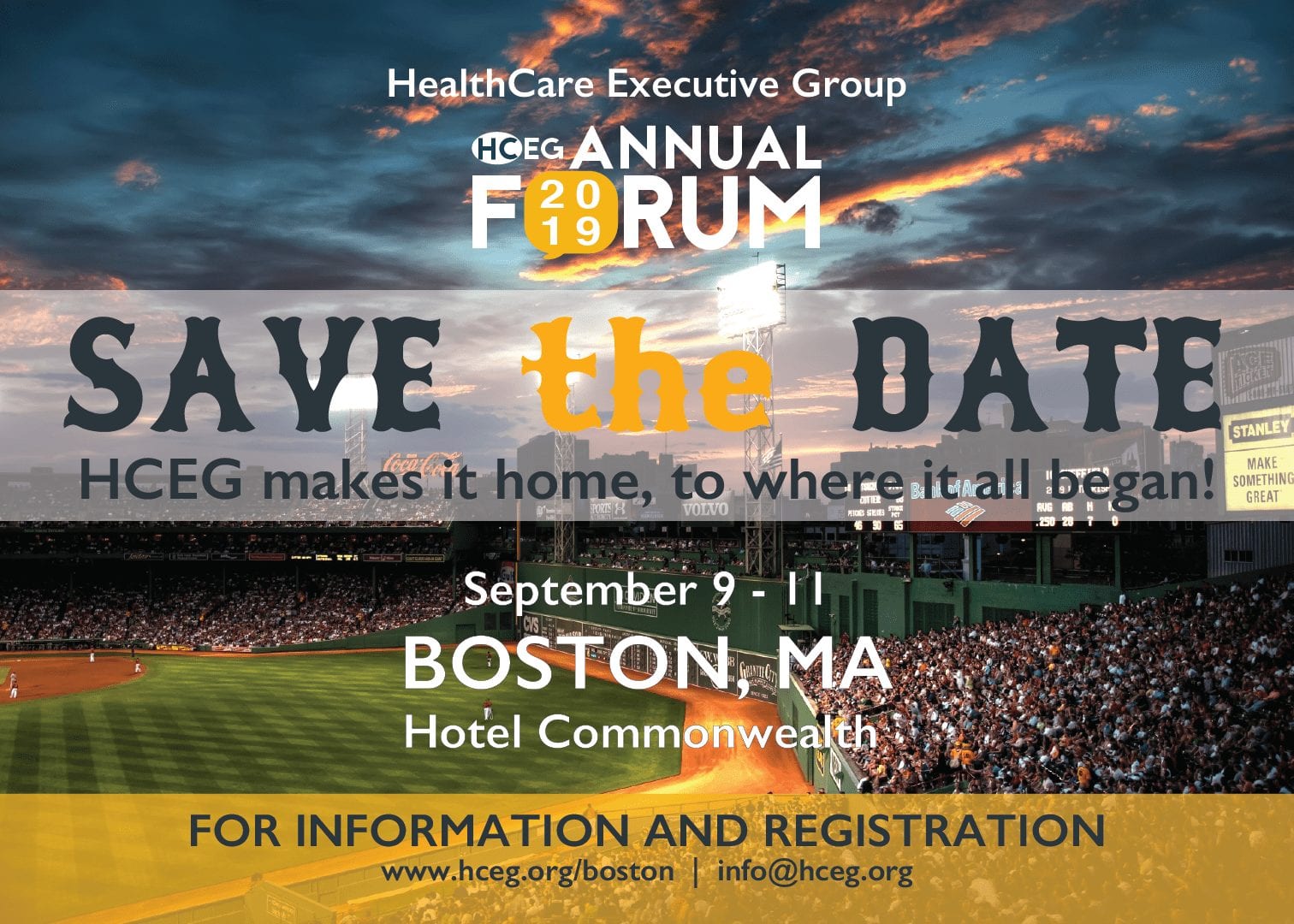


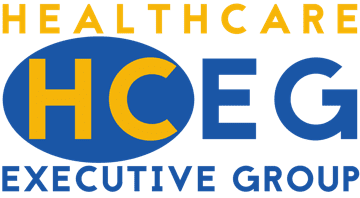
[…] RELATED: Recapping 16th Annual World Health Care Congress & CIO/CTO Strategy Track […]
[…] Recapping 16th Annual World Health Care Congress & CIO/CTO Strategy Track […]
[…] In addition, HCEG presented the CIO & CTO Strategy Track at the 16th Annual World Health Care Congress. This track consisted of six separate sessions over two days. See the recap of the WHCC event and the CIO & CTO Strategy track presented by HCEG here. […]